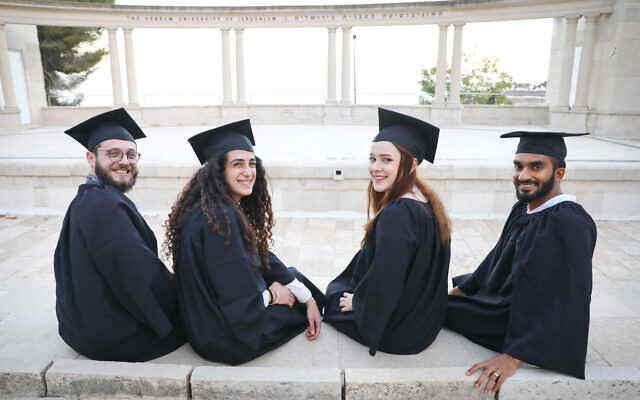The Hebrew University of Jerusalem: Building a Brighter Future
Founded nearly a century ago by renowned intellectuals and innovators, including Albert Einstein, Martin Buber, and Sigmund Freud, Hebrew University is Israel’s premier institution of higher learning, and consistently ranks among the top 5% of the world’s universities.
Based in one of the world’s most ancient and holiest cities, the Hebrew University of Jerusalem (HU) shines brighter than ever as Israel’s precious jewel of academia, research, and innovation.
Home to the oldest of six campuses, Jerusalem’s Mount Scopus is a great place to get a firsthand look at HU’s academic leadership and innovative research that strengthen the State of Israel and benefit people around the globe.
Founded nearly a century ago by renowned intellectuals and innovators, including Albert Einstein, Martin Buber, and Sigmund Freud, Hebrew University is Israel’s premier institution of higher learning, and consistently ranks among the top 5% of the world’s universities.
While Jerusalem is well known for its ancient heritage, it is also a technological incubator, anchored by the university and its world-renowned, Nobel prize-winning achievements. Home to increasing numbers of high-tech and biomedical start-ups, Jerusalem is ranked within the top 100 startup ecosystems globally according to StartupBlink, the startup ecosystem map and research center. Additionally, in the field of Life Sciences (LS), Jerusalem is ranked among the top 10 ecosystems in the world with more than 150 LS-focused startups located in the city. Within Jerusalem, the Hebrew University serves as the locus of innovation for myriad sectors working to strengthen Israel and positively impact the world.
Widely regarded as Israel’s intellectual powerhouse, HU generates breakthrough research discoveries, provides new Jewish history insights, trains medical professionals, and develops alternative food sources to feed the world. One shining example is Believer® Meats, founded by Prof. Yaakov Nahmias, which will soon complete construction of the world’s largest cultivated meat facility in North Carolina.
Innovation Today and in the Future
Discoveries in nano drug delivery, water reclamation, cybersecurity, quantum-secured communications, and research into therapeutic drugs derived from cannabis and psychedelics are just a few of the outstanding research initiatives currently underway in HU laboratories.
Advancements in healthcare have a long history at HU, and this tradition continues today. Computational medicine—the marriage of big data with a patient’s individual history—promises great improvements in healthcare. Hebrew University is leading this movement with its plans to build a new Center for Computational Medicine on its Ein Kerem Jerusalem campus.
With nearly a century of service to Israel and the world, HU remains at the forefront of research and advancement, and the university is still experiencing significant growth. On the Safra campus, a new Center for Sustainability is being built to help to mitigate the harmful effects of climate change. Quantum information, nanoscience, and nanotechnology will be combined under one roof and HUJI-TECH, Jerusalem’s new home for cutting-edge high-tech development will be located there. Construction of a new Center for Advanced Legal Studies, as well as major renovations to the archaeology building are taking place on the Mt. Scopus campus, along with new faculty and student housing to accommodate continuing growth.
The university’s success can be attributed in part to its commitment to interdisciplinary research. At HU, academics are encouraged to interact with their colleagues from various disciplines as well as academics throughout the world, thereby breaking down the silos that can obscure the big picture and inhibit innovation.
This cooperative ethos is visible in the Center for Sustainability, where academics and the HU community work together to build a greener, sustainable future; the Edmond and Lily Safra Center for Brain Sciences (ELSC), where a thriving interface between theory and experimentation leads to exciting new discoveries in brain research; and the Institute of Archaeology, where excavations at sites rich in Jewish history are coupled with a computational archaeology lab and a laboratory for ancient technologies.
Under the auspices of American Friends of the Hebrew University (AFHU), U.S. donors, both large and small, have supported the research and innovation that makes Hebrew University such a valued part of Israel’s reputation for advanced science and academic achievement. In addition to raising awareness and funds for the university, AFHU helps it attract and retain outstanding faculty, build teaching and research facilities, and provide scholarships and fellowships to Israel’s next generation of leaders. For more information, please contact AFHU National Director of Development at southeast@afhu.org or 561.948.3342.
Sponsored content by American Friends of Hebrew University




comments